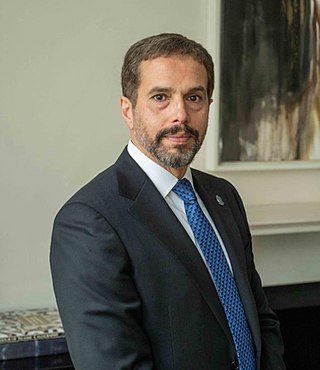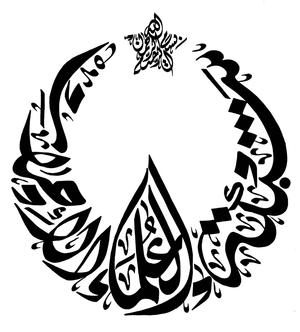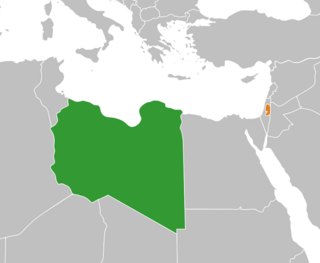Related Research Articles

Mohammed El Senussi is the son of Crown Prince Hasan as-Senussi of Libya, and of Crown Princess Fawzia bint Tahir Bakeer. Born in Tripoli, he is considered by Libyan royalists to be the legitimate heir to the Senussi Crown of Libya.
The media of Libya consists of a broad range of newspapers, TV channels, radio stations, and websites mostly set up during or after the Libyan Civil War, which removed previously tight restrictions on freedom of the press and freedom of speech. By the summer of 2012, there were over 200 registered newspapers, over 20 TV channels, and 200 radio stations.

The Kingdom of Libya, known as the United Kingdom of Libya from 1951 to 1963, was a constitutional monarchy in North Africa that came into existence upon independence on 24 December 1951 and lasted until a bloodless coup d'état on 1 September 1969. The coup, led by Muammar Gaddafi, overthrew King Idris and established the Libyan Arab Republic.

The 1951 Libyan Constitution was brought into force on October 7, 1951, prior to Libya's formal declaration of its independence on December 24, 1951 as a constitutional and hereditary monarchy under the rulership of King Idris. The enactment of the Libyan Constitution was significant in that it was the first and only piece of legislation that formally entrenched the rights of Libyan citizens after the post-war creation of the Libyan nation state.

The Network of Free Ulema – Libya is a group of senior religious leaders, or ulama, from all areas of Libya. Due to the persistent's security constraints with families and associates of those opposing Muammar Gaddafi being taken hostage none of the names of members have been released. However, they have been very vocal in the international media throughout the Libyan Civil War, releasing a constant stream of statements, appeals, calls, endorsements, responses and fatwas. Since the liberation of Libya the Network of Free Ulema have formed a larger organization of Libyan religious scholars called the League of Libyan Ulema, headed by Sheikh Umar Abdul Hamid al Mawlud.
Huda Ben Amer is a former Libyan politician. A follower of the Libyan ruler, Colonel Muammar Gaddafi, she was the Secretary of the General People's Congress of Inspection People's Control and mayor of Benghazi until the Libyan Civil War.
Fathi Mohammed Baja, also called Fatih Baja, is a Libyan academic and was a member of the National Transitional Council in charge of political affairs and representing Benghazi. Today he is Libya's Ambassador to Canada.

Ansar al-Sharia in Libya was an Al-Qaeda-aligned Salafi Jihadist militia group that advocated the implementation of Sharia law across Libya. Ansar al-Sharia came into being in 2011, during the Libyan Civil War. Until January 2015, it was led by its "Amir", Muhammad al-Zahawi. As part of its strategy, the organization targeted specific Libyan and American civilians for death and took part in the 2012 Benghazi attack. The group was designated as a terrorist organization by the United Nations, Iraq, Turkey, the United Arab Emirates, the United Kingdom and the United States.

Salwa Bugaighis was a Libyan human rights and political activist. She was assassinated in Benghazi, Libya on 25 June 2014.
This is a detailed timeline of the Libyan civil war (2014–2020) which lasted from 2014 to 2020.
Ismail al-Salabi is a Libyan citizen and Islamist militant leader who has deep rooted ties to the Libyan Muslim Brotherhood. He was the commander of the rebel forces in Benghazi under the 17 February Brigade.

Wafa Albueise is a Libyan lawyer and writer.
Mahmoud Mustafa Busayf al-Werfalli was a Libyan general, commander in al-Saiqa, an elite unit of the Libyan National Army, one of the warring factions in Libya's civil war since 2014. Al-Werfalli was indicted in 2017 in the International Criminal Court for the war crimes of murder and ordering the murder of non-combatants under article 8(2)(c)(i) of the Rome Statute. As of 6 April 2019, the ICC had two outstanding warrants for al-Werfalli's arrest. He was assassinated on 24 March 2021 in Benghazi.
The Movement for the Return of Constitutional Legitimacy in Libya is a movement in Libya that advocates the reinstatement of the 1951 Constitution and the restoration of the historic Senussi monarchy.
Seham Sergiwa is a Libyan psychologist elected to the Libyan parliament in 2014. She was abducted by a Libyan National Army militia loyal to Khalifa Haftar on 17 July 2019. The United Nations Support Mission in Libya expressed its deep concern and stated that "silencing the voices of women in decision-making positions [would] not be tolerated." As of 17 October 2019, Sergiwa's location was unknown and the "authorities in eastern Libya" had not published the results of any investigation.

The Battle of Bayda was the first conflict that broke out during the First Libyan Civil War between the brigades of Colonel Muammar Gaddafi and the Libyan rebels in the 4th-largest city in the country, the city of Bayda and its suburbs. The battle took place as a result of the demonstrations calling for the fall of the regime in Bayda, and after that the demonstrators clashed with the internal security in the city and the Talaa Khamis Brigade and the mercenaries and the Hussein Al-Jouifi Brigade stationed in Shahhat and Al Abraq International Airport in Bayda. The fighting continued one day in Bayda and the city was liberated, and then the Libyan revolutionaries headed to the outskirts of the city in Shahhat and Al-Abraq Airport. The revolutionaries were able to control the city and its suburbs, and thus Bayda was the first city to break out of Gaddafi's control and remained under their control throughout the revolution.

Khadījah Muhammad Abdullah Al-Jahamī, also knowns as Bint al-Watan, was a Libyan writer and radio broadcaster, who is considered one of the pioneers of advocating for women's rights since the Italian colonial period in Libya.

Najla Mohammed El Mangoush is a Libyan diplomat and lawyer. She was Libya's foreign minister in Abdul Hamid Dbeibeh's government from 15 March 2021 until her dismissal on 28 August 2023. El Mangoush has been Libya's first and only female foreign minister, and the fifth woman to hold the position of a foreign minister in the Arab World.

Libya–Palestine relations are bilateral relations between the Libya and State of Palestine. Palestine has an embassy in Tripoli and a consulate in Benghazi. Both countries are members of the Arab League, the Organisation of Islamic Cooperation, and the Non-Aligned Movement.

The Libya national badminton team represents Libya in international badminton team competitions. The team is controlled by the Libyan Badminton Federation located in the capital city of Tripoli. As of now, the Libyan team have yet to compete in any international team tournament.
References
- ↑ "ضيفة الثقافة: الكاتبة والشاعرة الليبية خديجة بسيكري". مونت كارلو الدولية (in Arabic). Retrieved November 21, 2017.
- ↑ "منظمة أمازونات ليبيا تطلق "الحقيبة الثقافية"". بوابة الوسط. Retrieved November 21, 2017.
- ↑ "أمسية شعرية لبسيكري بمختبر القصة القصيرة". بوابة الوسط. Retrieved November 21, 2017.
- ↑ ""أمازونات ليبيا" تنظم دورة تثقيفية عن الإسعافات الأولية". بوابة الوسط. Retrieved November 21, 2017.